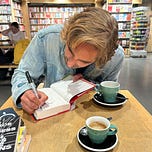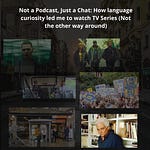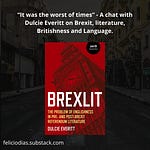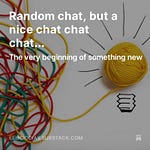Northwest London days and a remarkable interview - Sounds of grim England epitomized in literature: a conversation on language, identity, and extremism with Nicolas Padamsee.
[This is part of an interview I conducted with Nicolas Padamsee for a postdoctoral project. The interview is intended solely for academic purposes. However, I decided to write a narrative that encapsulates some of this experience]
Disclaimer
Since this was recorded inside a coffee shop, where people were speaking loudly and baristas were putting a lot of effort into brewing the best coffee and making the nicest espresso, you might face some challenges while listening. So, bear with us and enjoy the wonders of an organic, spontaneous, real-life conversation about books, history, politics, and social life
https://drive.google.com/drive/folders/16fp5QsktZeqY3-7BHJpAc12yqE_fiCpl?usp=sharing
I've added an audio narration to my text in case you want to follow it.
Below, you’ll find a recording of the text if you’d like to listen to it. Not 100% good, but t's fair enough.
BEFORE LISTENING TO OUR CHAT… a lovely introduction.
I've written my umpteenth draft of text to do justice to the magnitude of the writer I am about to introduce here. If you have followed my Substack closely, it's highly likely that you have read a text where I share the ebb and flow of my days spent in London. Besides the courses and the considerable amount of caffeine I consumed, I was able to take away valuable lessons from insightful conversations I had. In essence, this is the quiddity of cultural exchange - being unconditionally open to unexpected connections, as if we were living frugally on surprise.
Knowing I would spend the better part of 8 days in London, I spared no effort to reach out to one of the writers who had shattered my world and prompted me to meditate on matters I hadn't given much thought to. Before I sent an official invitation for a face-to-face chat, I carved out time for quality reading and indulged myself in his novel. I was completely hooked on his unputdownable book, and I was forced to take some time out to devour this grand narrative called 'England Is Mine.' (Side note: I read the entire novel on my Kindle, as the paperback was not available in Brazil.)
No sooner had I read the book than I got in touch with him. I was in dire need of a meaningful chat with that young English writer who had composed one of the most earth-shattering books on the deconstruction of English identity and toxic masculinity among young non-British boys. He promptly responded to my message and, much to my astonishment, he agreed to chat with me. He said we would meet up at a neighborhood coffee shop on Oxford Street
If I am being honest, at no time did I attempt to disguise my amazement and excitement. I would also say that having scheduled this chat was, however, quite distressing, as it hadn't dawned on me that we were going to meet in person.
Even though I was overly excited about meeting him near Oxford Street, we ended up hitting a cafe inside one of the 10,000 Waterstones scattered across London. Needless to say, I got there two hours before our meeting, but he met me at 4 on the dot.
My voice cracked, and for a minute, I truly believed I didn't know how to speak English. Not even the best pronunciation or lexis course I’ve ever taken had any impact on those first few minutes of conversation, nor did the rehearsals I had done, the questions I memorized, or even the effort of trying to sound as composed as possible. I was afraid he wouldn’t understand my heavy accent, afraid he wouldn’t grasp what I wanted from that conversation.
Truth be told, it wouldn’t have been any different. In hindsight, I would have done everything the same way. The first 10 minutes felt like a nightmare; I thought I was going to faint. No surprise that I was on an empty stomach, but I treated myself to a Coke, believing it would do me good as I navigated a stress-inducing situation - of course, all in my mind. It ultimately came down to imagination. So, having a Coke instead of coffee struck me as a clever choice. He was actually extremely gentle and generous, trying to break the ice. Oh, he also treated me to an espresso. <3
He showed a willingness to engage in spontaneous conversation and asked me a boatload of questions about my experience in London. To my relief, we spent a few minutes having a very informal chat, which was instrumental in helping me decompress. His social skills eased the tension, and I felt a heavy weight lift off my shoulders. While he listened to my digressions about London, I mentally rehearsed the questions I had planned to ask him. Thirty minutes later, I pressed the record button, and my mobile phone signaled that the real chat was about to start.
Nicolas Padamsee and England is Mine
Nicolas Padamsee grew up in Essex. He holds an MA and PhD in Creative Writing from the University of East Anglia, and is one of the Observer's best new novelists for 2024. His PhD research revolved around the topic of extremism, reflecting in his fictional writing and the key issues his characters need to grapple with in the fictional world he crafted.
As I have already written about this novel before, I will try to reproduce the most important parts of the main plot, hoping it may whet your appetite. His writing is the living-proof that contemporary writers are pushing the envelope on urgent topics, prompting readers to think globally instead of clinging to their entrenched, homegrown notions of nationalism and patriotism - ideas nurtured within family contexts and deliberately foisted upon us.
The novel is primarily set in London. To be more precise, in East London. Islamophobia, and toxic masculinity are intertwined with the exuberant and undeniably brilliant language employed by Nicolas Padamsee. David, a member of a generation of Iranians living in East London, finds solace in Karl Williams, a singer who has made pro-LGBTQ comments but perilous Islamophobic remarks about Muslim children. Things took a turn for the worse when he was assaulted by two Muslims, which led him to join a neo-Nazi online group.
Additionally, the intersection between David and this artist epitomizes the radicalization of discourse derived from the far-right wing in the UK. At the far end of this narrative, Hassan is the driving force of a counter-narrative, representing the stark reality of a boy from the second generation of Muslims living in the same London as Hassan.
While the tragic sequence of events unfortunately mirrors the appalling reality, none of the characters are portrayed in a reduced or biased manner. On the contrary, what draws me to this novel is the extent to which these layered characters surpass the mere ethos of feelings and sensitive emotions. The language used to disseminate discourse of hate and Islamophobic rhetoric is the same English language we speak.
The writers sought to offer an insightful literary work on internet subculture, incels, radicalization, and Islamophobia—but language is undeniably the cynosure of this gripping yet devastating political and social tragedy.
Rather than simply conveying a superficial and unrealistic image of sheer perfection, England is Mine calibrates the layers of issues rooted in our society, inviting us to explore the challenges embedded in our existence. Rarely do I add a debut writer to the pantheon of brilliant minds who envision a much-needed sustainable social ecosystem—one that encompasses environmental issues, gender, identity, language, politics, history, and the arts—and who also seem to have a clear vision of how society should evolve in the coming years.
Not only have they provided a comprehensive examination of the root causes of most of our social conflicts, but they have also joined forces to craft boundary-pushing novels, through meticulously researched narratives where characters grapple with a heightened tension between tradition and modernity. When writers set out to scrutinize secular problems shaped by social and financial upheavals—the aftermath of our contemporary stage of capitalism—readers are confronted with texts in which characters are burdened and constrained by their innermost thoughts and traumas. This is precisely the case with Nicolas Padamsee—one of my current literary obsessions, whose books have garnered a downpour of raving reviews.
His writing is nothing short of a staggering kaleidoscope of jaw-dropping pieces that, when assembled by readers, produce layered and nuanced plots laying bare the perils and pitfalls of our existence in a grim and obscure 21st century—a world swallowed up by wars, territorial disputes, and the niche phenomenon of far-right resurgence within contexts where diversity and a convivial atmosphere are juxtaposed against our personal lives and subjectivities. Padamsee has been lavishly praised and broadly acknowledged by critics, avid readers and individuals enthusiastic about urgent issues in the realm of humanities.
The success of the novel is unquestionably due to the author's sheer determination and commitment to composing well-crafted and layered characters. However, the pernicious use of language is partly what drives the novel, especially the richness of the language. Part of this text aims to shed light on the queries that are the driving force of the novel, but I also seek to remind readers that literature, like any other form of thought, can be interpreted as a social, political, and historical document of the humanitarian crises that our society has largely deepened over the past years. Grab your coffee and enjoy our conversation
Note:I was a bag of nerves, as you may have noticed, which means that hesitation, repetition, mispronunciation, and a lack of words are all part of the show.
Main topics
Power of literature / radicalisation and extremism
Life online and radicalism of extremism
Online games
Toxic masculinity among young boys
Male writers and the deconstruction of britishness
Young boys and violence in the UK
Communication and connections among men - room for sexism
Architecture of games and our world - different ways men are forming relationships
Online life
PhD research
How men deal with emotion without resorting to violent communication
Political novels and interpretation
The deconstruction of identity through language
Language, accent and stigmas
Using language to name feelings
Brazilian and English literature intertwined. - Diary of the fall, Michel Laub.
Language that comes from family
Influences and references
Left and the right in politics
Brexit
Derrida, Bakhtin, Music and other references
Arctic Monkeys and The Libertines
Chavs, England and Arctic Monkey: English Language
Sleaford Mods, accent, Language and the working-class
Mark Fisher - https://www.thewire.co.uk/in-writing/the-portal/archive-portal-mark-fisher
Family Background - India, Germany and Essex/UK
Multiculturalism and Mixed race families
British-brazilian writer : Yara Rodrigues
Immigrant and global literature
English and Brazil
Language employed in the novel
Novel plot - tragedy
Language isn't neutral - internet and online language
The role of language
Language of teenagers growing up in London
Zadie Smith and language
On the road - vivid and vibrant language
Listening to sounds of fiction
Language, literature, English and the sounds of a novel
Sounds, English and stigma
Accent and oral tradition
Follow Nicolas and buy his book.
https://www.instagram.com/npadamsee/













Share this post